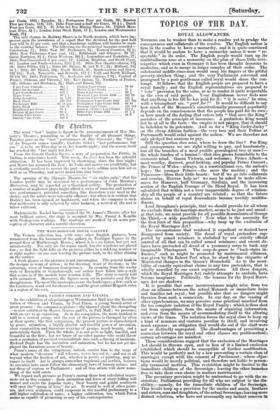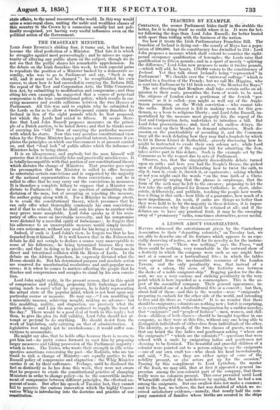TOPICS OF THE DAY.
ROYAL ALLOWANCE&
NOTHING can be weaker than to make a resolve yet to grudge the consequences and collaterals of the resolve. The English nation is firm in the resolve to have a monarchy, and it is quite convinced that it would be useless to have a monarchy unless it were " re- spectable " in its order. The English people would turn up its multitudinous nose at a monarchy on the plan of those little sove- reignties which even in Germany it has been thought decorous to mediatize, and so to merge in larger samples of their order. The substantial middle-class-man would snap his fingers at the pitiful poverty-stricken thing; and the very Parliament convened and prorogued by a poor gentleman called royal would share the con- tempt. It follows that the English people are prepared to have a royal family; and the English representatives are prepared to " vote " provision for the same, so as to render it quite respectable in the eyes of said people. Your Englishman never feels sure that anything is his till he has paid for it : "it is mine" he cries, with a triumphant air, "paid for ! " It would be difficult to say how much of the Monarch's constitutionally presumed popularity depends on the consciousness that the people has paid for its own; or how much of the feeling that enters into "God save the King" partakes of the principle of insurance. A gratuitous King would not be at all to the taste : the empire is not pauper, that it should be beholden to its potentate. And as for a "King Jacky-Jacky" on the cheap African fashion—the very tars and their Ponies at Portsmouth would rebel against the notion. We are therefore not only pledged but anxious to pay. Still the question does arise, where to draw the line P For King and consequences we are right willing to pay, and handsomely ; but all the branches of a most prolific genealogical tree at once !— the whole burden of a banianl—that idea grows formidable to the economic mind. Queen Victoria, and welcome; Prince Albert—a most worthy, discreet, good-looking, and popular Prince Consort ; the Prince of Wales—always, in a constitutional eye, the nation's hope ; the younger Princes—the more the merrier ; and the Princesses—bless their little hearts : but if we go into collaterals and cousins, Heaven help us ! we may be asked to make allow- ances for Hanover, half Germany, Sardinia and the increasing section of the English Peerage of the Blood Sardinia, It has been calculated that within not a very inappreciable degree of relation- ship all the people of a country are related ; so that the future claims on behalf of royal descendants become terribly multitu- dinous.
Lord Brougham's principle, that we should provide for all whom we exclude from the marriage-market, seems to be just and sound : at that rate, we must provide for all possible descendants of George the Third,—a wide possibility ! Now what is the necessity for the first limb of this proposition—why keep up the exclusion of the Royal Marriages Act P
The circumstances that rendered it expedient or desired have disappeared from society. The dread of royal pretenders sup- ported by armed retainers is abolished by our strictly official control of all that can be called armed retainers; and recent de- bates have prevented all dread of a yeomanry corps to back any imaginable Plantagenet. The coup-de-graee to "back-stairs in- fluence," such as might be promoted by matrimonial alliances, was given by Sir Robert Peel when he stood by the etiquette of Ministerial changes in the Queen's Household. As to the possi- bility of exactly equivalent claims in any two pretenders, that is utterly annulled by our exact registrations. All these dangers, which the Royal Marriages Act rudely attempts to exclude, have become imaginary. Politically, the reasons for the Royal Marri- ages Act are shadows. It is possible that some inconvenienoes might arise from too close an alliance between the actual Monarch or• immediate heirs and families not royal ; but possible also that no dangers might threaten from such a connexion. In our day, on the ceasing of other apprehensions, we may perceive some practical mischief from the too complete isolation of the Royal Family; which is thus shut out from sympathies, from the means of acquiring information, and even from the means of accommodating itself to the altering views of the times. The isolation forces the royal class to keep up a kind of manners and customs peculiar to itself, and involving much expense ; an obligation that would die out if the clasPi were not so distinctly segregated. The disadvantages of permitting a connexion between the royal and other classes are problematical ; certain advantages are manifest.
These considerations suggest that the exclusion of the Marriages Act should be thrown open, and in lieu of it a limited exolusion established which should be susceptible of further modification. This would be perfectly met by a law preventing a certain class of marriages except with the consent of Parliament; whose objec- tions would be merely political, and therefore not liable to person- ally tyrannical motives. This restriction might be limited to the immediate children of the Sovereign ; leaving the other branches free to take their own choice in matters matrimonial.
The pecuniary provision might be understood to go with the re- striction; Parliament providing for all who are subject to the dis- ability,—namely, for the immediate children of the Sovereign. This would keep up a provision for the uncles and aunts, brothers and sisters, sons and daughters, of the actual Sovereign; leavingmore distant relatives, who have not necessarily any instant oonoern in
state affairs, to the usual resources of the world. In this way would arise a semi-royal class, uniting the noble and wealthier classes of this country to the Crown by a connexion socially but not poli- tically recognized, yet having very useful influences even on the political action of the Government.



























 Previous page
Previous page